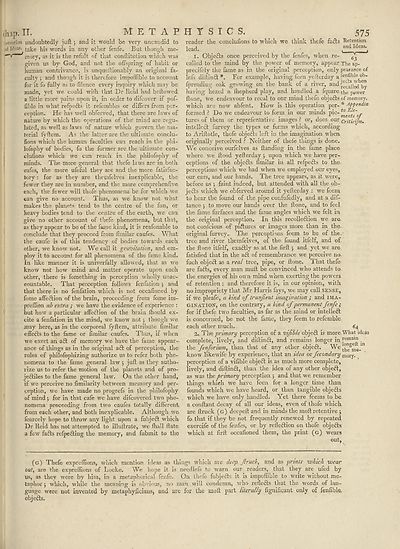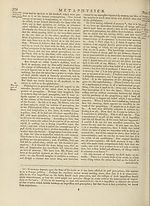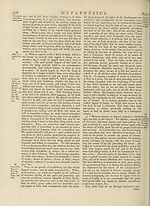Encyclopaedia Britannica, or, a Dictionary of arts, sciences, and miscellaneous literature : enlarged and improved. Illustrated with nearly six hundred engravings > Volume 13, MAT-MIC
(621) Page 575
Download files
Complete book:
Individual page:
Thumbnail gallery: Grid view | List view

hap. II.
etention undoubtedly juft j and it would be very uncandid to
,d Ideas, words in any other fenle. But though me-
rnory, as it is the refult of that confutation which was
given us by God, and not the offspring of habit or
human contrivance, is unqueftionably an original fa¬
culty } and though it is therefore impoffible to account
for it fo fully as to filence every inquiry which may be
made, yet we could with that Dr Reid had beftowed
a little more pains upon it, in order to difeover if pof-
fible in what refpe&s it refembles or differs from per¬
ception. He has well obferved, that there are laws of
nature by which the operations of the’ mind are regu¬
lated, as well as laws of nature which govern the ma¬
terial fyftem. As the latter are the ultimate conclu-
fions which the human faculties can reach in the phi-
lofophy of bodies, fo the former are the ultimate con-
elufions which we can reach in the philofophy of
minds. The more general that thefe laws are in both
cafes, the more ufeful they are and the more fatisfac-
tory : for as they are theoifelves inexplicable, the
fewer they are in number, and the more comprehenfive
each, the fewer will thofe phenomena be for which we
can give no account. Thus, as we know not what
makes the planets tend to the centre of the fun, or
heavy bodies tend to the centre of the earth, we can
give no other account of thefe phenomena, but that,
as they appear to be of the fame kind, it is reafonable to
conclude that they proceed from fimilar caufes. What
the caufe is of this tendency of bodies towards each
other, we know not. We call it gravitation, and em¬
ploy it to account for all phenomena of the fame kind.
In like manner it is univerfally allowed, that as we
know not how mind and matter operate upon each
other, there is fomething in perception wholly unac¬
countable. That perception follows fenfation ; and
that there is no fenfation which is not occafioned by
fome affe&ion of the brain, proceeding from fome im-
preftion ab extra ; we have the evidence of experience :
but how a particular affcdlion of the brain fhould ex¬
cite a fenfation in the mind, we know not; though we
may here, as in the corporeal fyftem, attribute fimilar
effects to the fame or fimilar caufes. Thus, if when
we exert an a6t of memory we have the fame appear¬
ance of things as in the original aft of perception, the
rules of philofophizing authorize us to refer both phe¬
nomena to the fame general law ; juft as they autho¬
rize us to refer the motion of the planets and of pro-
jeftiles to the fame general law. On the other hand,
if we perceive no fimilarity between memory and per¬
ception, we have made no progrefs in the philofophy
of mind; for in that cafe we have difeovered tsvo phe¬
nomena proceeding from two caufes totally different
from each other, and both inexplicable. Although we-
fcarcely hope to throw any light upon a fubjeft which
Dr Reid has not attempted to illuftrate, we {hall ftate
a few fafts refpefting the memory, and fubmit to the
575
reader the conclufions to which we think thefe fafts Retention
lead. _ .andIdeas-,
i. Objefts once perceived by the fenfes, when re-
called to the mind by the power of memory, appear The ap-
precifely the fame as in the original perception, only pearance of
lefs diltinft *. For example, having feen yefterday a fenfible^ob-
fpreading oak growing on the bank of a river, and j,"
having heard a fhepherd play, and handled a fquare the power
ftone, wre endeavour to recal to our mind thefe objefts of memory,
which are now abfent. How is this operation per- * Appendix
formed ? Do we endeavour to form in our minds pic- t0 E[c~ -
tures ox them or repreientative images r or, does our Criticijiiu
intellect furvey the types or forms which, according
to Ariftotle, thofe objefts left in the imagination when
originally perceived ? Neither of thefe things is done.
We conceive ourfelves as {landing in the fame place
where we flood yefterday j upon which we have per¬
ceptions of the objefts fimilar in all refpefts to the
perceptions which we had when we employed our eyes,
our ears, and our hands. The tree appears, as it were,
before us $ faint indeed, but attended with all the ob¬
jefts which we obferved around it yefterday : we feem
to hear the found of the pipe eonfafedly, and at a dif-
tance ; to move our hands over the ftone, and to feel
the fame furfaces and the fame angles which we felt in
the original perception. In this recolleftion we are-
not confcious of piftures or images more than in the
original furvey. The perceptions feem to be of the.
tree and river themfelves, of the found itfelf, and of
the ftone itfelf, exaftly as at the firft ; and yet we are
fatisfied that in the aft of remembrance we perceive no
fuch object as a real tree, pipe, or ftone. That thefe
are fafts, every man muft be convinced who attends to
the energies of his own mind when exerting the powers
of retention : and therefore it is, in our opinion, with
no impropriety that Mr Harris fays, we may call SENSE,
if we pleafe, a kind of tranfient imagination ; and ima¬
gination, on the contrary, a kind of permanent fenfe ;
for if thefe two faculties, as far as the mind or intelleft
is concerned, be not the fame, they feem to refemble
each other much. 64
perception of a vifible objeft is as much more complete,
lively, and diftinft, than the idea of any other objeft,
as was the primary perception ; and that we remember
things which we have feen for a longer time than
founds which we have heard, or than tangible objefts
which we have only handled. Yet there feems to be
a conftant decay of all our ideas, even of thofe which
are ftruck (g) deepeft and in minds the moft retentive j
fo that if they be not frequently renewed by repeated
exercife of the fenfes, or by relleftion on thofe objefts
which at firft occafioned them, the print (g) wears
out,
M E T A P H Y S I C S.
(g) Thefe expreflions, which mention ideas as things which are deep fruck, and as prints which wear
out, are the expreffions of Locke. vVe hope it is needlefs to warn our readers, that they are ufed by
us, as they were by him, in a metaphorical fenfe. On thefe fubjefts it is impoffible to write without me¬
taphor j which, while the meaning L obvious, no man will condemn, who reflefts that the words of lan¬
guage were not invented by metaphyficians, and are for the moft part literally fignincant only of fenfible.
objefts.
etention undoubtedly juft j and it would be very uncandid to
,d Ideas, words in any other fenle. But though me-
rnory, as it is the refult of that confutation which was
given us by God, and not the offspring of habit or
human contrivance, is unqueftionably an original fa¬
culty } and though it is therefore impoffible to account
for it fo fully as to filence every inquiry which may be
made, yet we could with that Dr Reid had beftowed
a little more pains upon it, in order to difeover if pof-
fible in what refpe&s it refembles or differs from per¬
ception. He has well obferved, that there are laws of
nature by which the operations of the’ mind are regu¬
lated, as well as laws of nature which govern the ma¬
terial fyftem. As the latter are the ultimate conclu-
fions which the human faculties can reach in the phi-
lofophy of bodies, fo the former are the ultimate con-
elufions which we can reach in the philofophy of
minds. The more general that thefe laws are in both
cafes, the more ufeful they are and the more fatisfac-
tory : for as they are theoifelves inexplicable, the
fewer they are in number, and the more comprehenfive
each, the fewer will thofe phenomena be for which we
can give no account. Thus, as we know not what
makes the planets tend to the centre of the fun, or
heavy bodies tend to the centre of the earth, we can
give no other account of thefe phenomena, but that,
as they appear to be of the fame kind, it is reafonable to
conclude that they proceed from fimilar caufes. What
the caufe is of this tendency of bodies towards each
other, we know not. We call it gravitation, and em¬
ploy it to account for all phenomena of the fame kind.
In like manner it is univerfally allowed, that as we
know not how mind and matter operate upon each
other, there is fomething in perception wholly unac¬
countable. That perception follows fenfation ; and
that there is no fenfation which is not occafioned by
fome affe&ion of the brain, proceeding from fome im-
preftion ab extra ; we have the evidence of experience :
but how a particular affcdlion of the brain fhould ex¬
cite a fenfation in the mind, we know not; though we
may here, as in the corporeal fyftem, attribute fimilar
effects to the fame or fimilar caufes. Thus, if when
we exert an a6t of memory we have the fame appear¬
ance of things as in the original aft of perception, the
rules of philofophizing authorize us to refer both phe¬
nomena to the fame general law ; juft as they autho¬
rize us to refer the motion of the planets and of pro-
jeftiles to the fame general law. On the other hand,
if we perceive no fimilarity between memory and per¬
ception, we have made no progrefs in the philofophy
of mind; for in that cafe we have difeovered tsvo phe¬
nomena proceeding from two caufes totally different
from each other, and both inexplicable. Although we-
fcarcely hope to throw any light upon a fubjeft which
Dr Reid has not attempted to illuftrate, we {hall ftate
a few fafts refpefting the memory, and fubmit to the
575
reader the conclufions to which we think thefe fafts Retention
lead. _ .andIdeas-,
i. Objefts once perceived by the fenfes, when re-
called to the mind by the power of memory, appear The ap-
precifely the fame as in the original perception, only pearance of
lefs diltinft *. For example, having feen yefterday a fenfible^ob-
fpreading oak growing on the bank of a river, and j,"
having heard a fhepherd play, and handled a fquare the power
ftone, wre endeavour to recal to our mind thefe objefts of memory,
which are now abfent. How is this operation per- * Appendix
formed ? Do we endeavour to form in our minds pic- t0 E[c~ -
tures ox them or repreientative images r or, does our Criticijiiu
intellect furvey the types or forms which, according
to Ariftotle, thofe objefts left in the imagination when
originally perceived ? Neither of thefe things is done.
We conceive ourfelves as {landing in the fame place
where we flood yefterday j upon which we have per¬
ceptions of the objefts fimilar in all refpefts to the
perceptions which we had when we employed our eyes,
our ears, and our hands. The tree appears, as it were,
before us $ faint indeed, but attended with all the ob¬
jefts which we obferved around it yefterday : we feem
to hear the found of the pipe eonfafedly, and at a dif-
tance ; to move our hands over the ftone, and to feel
the fame furfaces and the fame angles which we felt in
the original perception. In this recolleftion we are-
not confcious of piftures or images more than in the
original furvey. The perceptions feem to be of the.
tree and river themfelves, of the found itfelf, and of
the ftone itfelf, exaftly as at the firft ; and yet we are
fatisfied that in the aft of remembrance we perceive no
fuch object as a real tree, pipe, or ftone. That thefe
are fafts, every man muft be convinced who attends to
the energies of his own mind when exerting the powers
of retention : and therefore it is, in our opinion, with
no impropriety that Mr Harris fays, we may call SENSE,
if we pleafe, a kind of tranfient imagination ; and ima¬
gination, on the contrary, a kind of permanent fenfe ;
for if thefe two faculties, as far as the mind or intelleft
is concerned, be not the fame, they feem to refemble
each other much. 64
perception of a vifible objeft is as much more complete,
lively, and diftinft, than the idea of any other objeft,
as was the primary perception ; and that we remember
things which we have feen for a longer time than
founds which we have heard, or than tangible objefts
which we have only handled. Yet there feems to be
a conftant decay of all our ideas, even of thofe which
are ftruck (g) deepeft and in minds the moft retentive j
fo that if they be not frequently renewed by repeated
exercife of the fenfes, or by relleftion on thofe objefts
which at firft occafioned them, the print (g) wears
out,
M E T A P H Y S I C S.
(g) Thefe expreflions, which mention ideas as things which are deep fruck, and as prints which wear
out, are the expreffions of Locke. vVe hope it is needlefs to warn our readers, that they are ufed by
us, as they were by him, in a metaphorical fenfe. On thefe fubjefts it is impoffible to write without me¬
taphor j which, while the meaning L obvious, no man will condemn, who reflefts that the words of lan¬
guage were not invented by metaphyficians, and are for the moft part literally fignincant only of fenfible.
objefts.
Set display mode to:
![]() Universal Viewer |
Universal Viewer | ![]() Mirador |
Large image | Transcription
Mirador |
Large image | Transcription
Images and transcriptions on this page, including medium image downloads, may be used under the Creative Commons Attribution 4.0 International Licence unless otherwise stated. ![]()
| Permanent URL | https://digital.nls.uk/192692112 |
|---|
| Attribution and copyright: |
|
|---|
| Description | Ten editions of 'Encyclopaedia Britannica', issued from 1768-1903, in 231 volumes. Originally issued in 100 weekly parts (3 volumes) between 1768 and 1771 by publishers: Colin Macfarquhar and Andrew Bell (Edinburgh); editor: William Smellie: engraver: Andrew Bell. Expanded editions in the 19th century featured more volumes and contributions from leading experts in their fields. Managed and published in Edinburgh up to the 9th edition (25 volumes, from 1875-1889); the 10th edition (1902-1903) re-issued the 9th edition, with 11 supplementary volumes. |
|---|---|
| Additional NLS resources: |
|

